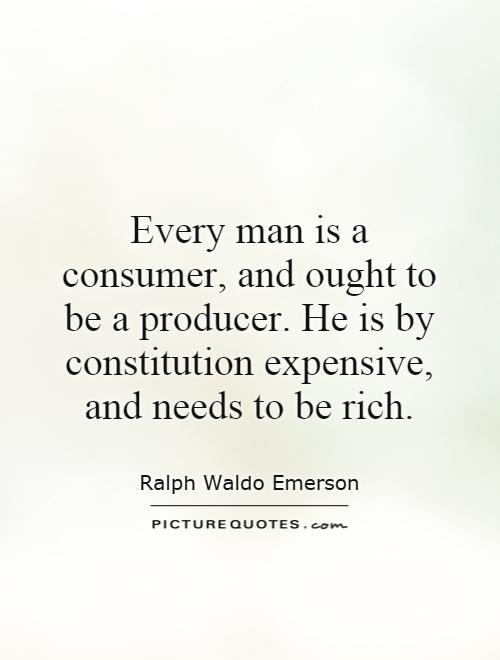Every man is a consumer, and ought to be a producer. He is by constitution expensive, and needs to be rich

Every man is a consumer, and ought to be a producer. He is by constitution expensive, and needs to be rich
Ralph Waldo Emerson, a renowned American essayist, lecturer, and poet, was a firm believer in the idea that every individual has the potential to be both a consumer and a producer. In his essay "Self-Reliance," Emerson emphasizes the importance of self-reliance and independence, urging individuals to take control of their own lives and destinies. He argues that every man is inherently a consumer, but that he also has the capacity to be a producer.Emerson believed that human beings are naturally inclined towards consumption, as they have needs and desires that must be fulfilled. However, he also recognized that individuals have the ability to create and produce, whether it be through their work, art, or ideas. Emerson believed that true fulfillment and richness come from being able to create and contribute to the world around us.
Emerson's philosophy can be seen as a call to action for individuals to take responsibility for their own lives and to strive for self-improvement. He believed that each person has a unique set of talents and abilities that can be used to create value and make a positive impact on the world. By embracing their role as both consumers and producers, individuals can achieve a sense of fulfillment and richness that goes beyond material wealth.
Emerson's ideas are particularly relevant in today's consumer-driven society, where people are often encouraged to prioritize material possessions and external validation. By emphasizing the importance of self-reliance and creativity, Emerson challenges individuals to look beyond the superficial and to focus on what truly matters in life.












 Friendship Quotes
Friendship Quotes Love Quotes
Love Quotes Life Quotes
Life Quotes Funny Quotes
Funny Quotes Motivational Quotes
Motivational Quotes Inspirational Quotes
Inspirational Quotes